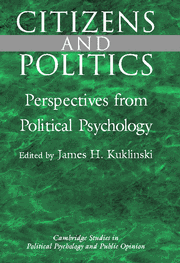Book contents
- Frontmatter
- Contents
- List of Contributors
- Prologue: Political Psychology and the Study of Citizens and Politics
- PART I AFFECT AND EMOTIONS
- PART II POLITICAL COGNITION
- PART III POLITICAL ATTITUDES AND PERCEPTIONS
- Introduction
- 9 Public Opinion and Democratic Politics: The Problem of Nonattitudes and Social Construction of Political Judgment
- 10 Implications of a Latitude-Theory Model of Citizen Attitudes for Political Campaigning, Debate, and Representation
- 11 Where You Stand Depends on What You See: Connections Among Values, Perceptions of Fact, and Political Prescriptions
- 12 Commentary: The Meaning of “Attitude” in Representative Democracies
- PART IV POLITICAL VALUES
- Index
- Titles in the series
9 - Public Opinion and Democratic Politics: The Problem of Nonattitudes and Social Construction of Political Judgment
Published online by Cambridge University Press: 07 October 2011
- Frontmatter
- Contents
- List of Contributors
- Prologue: Political Psychology and the Study of Citizens and Politics
- PART I AFFECT AND EMOTIONS
- PART II POLITICAL COGNITION
- PART III POLITICAL ATTITUDES AND PERCEPTIONS
- Introduction
- 9 Public Opinion and Democratic Politics: The Problem of Nonattitudes and Social Construction of Political Judgment
- 10 Implications of a Latitude-Theory Model of Citizen Attitudes for Political Campaigning, Debate, and Representation
- 11 Where You Stand Depends on What You See: Connections Among Values, Perceptions of Fact, and Political Prescriptions
- 12 Commentary: The Meaning of “Attitude” in Representative Democracies
- PART IV POLITICAL VALUES
- Index
- Titles in the series
Summary
The study of public opinion, although at one level preoccupied with the transient issues and political personalities of the day, takes its direction at a deeper level from a recurring consideration of a small number of enduring themes integral to the understanding of democratic politics. We want to take this opportunity to engage perhaps the most fundamental of these themes – the competence of ordinary citizens to discharge the responsibilities expected of them in modern democratic politics.
There is, of course, a distinguished literature deeply skeptical of the ordinary citizen's understanding of public affairs. But our concern here is not with the classic essays of Walter Lippman or Graham Wallas, notable and enduringly instructive as they are. Rather, we are concerned with more recent studies that purport to demonstrate that ordinary citizens lack attitudes on the important issues of the day.
Our concern is both normative and empirical. Democratic ideals cannot be reduced to issues of fact. But ideals, whether ethical or political, are subject to evaluation, and their evaluation cannot be indifferent to matters of fact. No one can be under an obligation to do what he or she does not have a capacity to do, and it cannot make sense to hold out as an ideal of conduct a standard of behavior that citizens cannot reach. The more imperfect ordinary citizens' understanding of political ideas, the less capable they are of grounded judgment, the more crabbed a creditable conception of democratic citizenship must be.
- Type
- Chapter
- Information
- Citizens and PoliticsPerspectives from Political Psychology, pp. 254 - 288Publisher: Cambridge University PressPrint publication year: 2001
- 12
- Cited by

